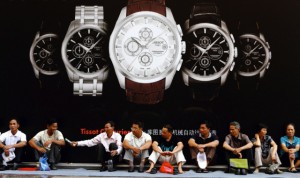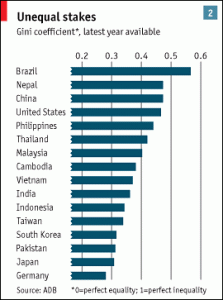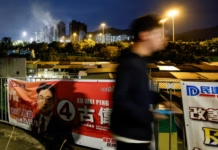New study puts China’s Gini coefficient at 0.61, almost level with South Africa • Real unemployment level double the official figure
Chinaworker.info
China’s sharply widening wealth gap places it among the most unequal nations, a new survey by a Chinese academic institute shows. The report, which was published on 9 December, adds to the pressure on China’s new authoritarian leaders who are anxious to defuse growing popular discontent. They pledged at their keynote congress in Beijing last month to narrow the wealth gap, although similar pledges have been made year after year.
The Gini coefficient, which is a widely used measure of inequality, reached 0.61 in 2010, the Survey and Research Center for China Household Finance noted in a report produced jointly with the central bank’s Institute of Financial Research. The Gini index is used by agencies such as the World Bank. The higher the reading, the more unequal a country is. “China’s household income gap is huge,” the report states. “A Gini coefficient as high as 0.61 is rare.”
The report’s findings confirm what we already knew: that China has in a few decades experienced a rapid rise of inequality, with “huge numbers” of poor people left behind by the so-called economic miracle. When Hu Jintao and Wen Jiabao came to power a decade ago, there were no dollar billionaires in China. Now as they retire there are 251 dollar billionaires, with only the USA able to claim more.
The report, based on a survey of 8,438 households, also estimated the urban jobless rate in July this year was 8.05 percent, nearly double the official figure. Gan Li, who presented the report, called on governments in China to restructure expenditures to focus on increasing social welfare instead of building roads and bridges.
Letting the Gini out of the bottle
The ‘communist’ (CCP) dictatorship has not published a national Gini coefficient for more than a decade, reflecting its sensitivity and embarrassment over this issue. The last time an official figure was released was 2000, showing a Gini reading of 0.412. In 2005, the Chinese Academy of Social Sciences, a state research body, estimated the Gini coefficient to be 0.47. Any reading over 0.4 is said to indicate a danger level for social instability. The World Bank has not published figures for China for many years, no doubt to avoid incurring Beijing’s displeasure. China is now the Bank’s third-largest shareholder.
Commenting on the report the Global Times, a regime mouthpiece, said China’s wealth gap is at an “alarming level”. Zheng Xinye, a professor at Renmin University of China, told the Global Times that the real Gini coefficient may be even higher than 0.61, since the super-rich are hard to reach for surveys.
There are few countries that have experienced an increase in inequality of almost 50 percent in just over a decade. At 0.61, China’s Gini coefficient places it among a handful of extremely unequal countries mostly found in Sub-Saharan Africa. South Africa, which is widely regarded as the most unequal society in the world, recorded a Gini level of 0.631 in 2009. The chart below from The Economist in 2007 shows how China’s wealth gap has shot ahead.
Yet the policy mix that can be expected from China’s new leaders may not only not close the wealth gap but rather widen it further. Fresh from a tour of Guangdong, the cradle of capitalism in China, and borrowing shamelessly from Deng Xiaoping’s ‘southern tour’ of twenty years ago, new leader Xi Jinping is promising to speed up capitalist ‘reforms’ in order to restructure the economy and give private investors a greater share. Yet as even ultra-liberal Caixin magazine pointed out, “Regionally, the report said, the index was higher in places with stronger market competition. The Gini figure for households in eastern provinces was higher than the figures for central and western regions.”
The shock findings from this report give further arguments against the disastrous pro-capitalist policies of the one-party dictatorship. Independent workers’ organisations must be built to lead the struggle against growing inequality and the wholesale theft of national resources by a tiny super-rich minority. The coming period will see growing interest in the socialist alternative to capitalism and authoritarian rule in China.





